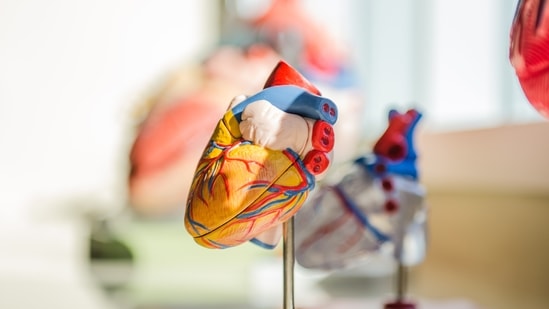Cardiologists say ‘even few extra kilos can impact cholesterol levels,’ share tips to reduce LDL and boost heart health
Maintaining healthy cholesterol levels is crucial for heart health, as high LDL cholesterol can raise the risk of heart disease. Small lifestyle changes and awareness can make a big difference. HT Lifestyle has reached out to medical experts to bring you insights and practical tips for managing cholesterol effectively and promoting a healthier heart. (Also read: Cardiologist says ‘stress is always a factor’ in heart attacks; shares 9 simple lifestyle tips to safeguard your heart )
How to manage high LDL cholesterol
Dr. PLN Kapardhi, Cath Lab Director, Senior Consultant, Cardiologist, Care Hospital, Banjara Hills, Hyderabad says, “When it comes to treating high LDL cholesterol, the first and most vital step is education. Patients must understand that cholesterol is not simply a number, but a key driver of heart disease. For many with mild elevations, lifestyle changes alone can bring LDL within healthy limits. However, for the majority of patients, particularly those with diabetes, obesity, or prior heart health events, lifestyle must be complemented by medical therapy.
He adds, “The targets will be set by the doctor as LDL goals vary. Repeated testing and timely dose adjustments are necessary; therefore, patients have to be proactive. Treating high LDL is not about quick fixes but about sustained protection, which requires both discipline and medical guidance.”
“Treatment paradigms have shifted in recent years, and this has been reflected in LDL cholesterol management. Previously, cholesterol-reducing medicines were prescribed for patients with LDLC levels above 130 mg/dL for those with diabetes or above 160 mg/dL for non-diabetics. Many times, people aren’t informed of this change, thinking medication is only prescribed to patients with high risks,” says Dr. Kapardhi.

He further notes, “New draft guidelines for the UK’s National Health Service (NHS) suggested broader use of cholesterol-lowering drugs, recommending that they be prescribed even to individuals with less than a 10 percent risk of heart attack or stroke within the next decade. This change is incorporated at a global level, which reflects that the approach has shifted to early action.”
Dr. Sarita Rao, Senior Interventional Cardiologist and Director Cath Lab at Apollo Hospital, Indore, emphasises, “Personalised care encourages communication and collaboration. Treatment plans are tailored as per patients’ risk profiles and clinical presentation. For patients, it is important to have open and honest conversations, communicating diverse needs, fears, concerns, and preferences openly. Instead of being a passive recipient of instructions, the patient becomes an active participant in their own treatment, and the responsibilities are distributed equally.”
What lifestyle changes and medications can improve cholesterol
“Taking care of the heart can start with changes in diet and lifestyle. Following a diet rich in fruits, vegetables, and whole grains is known to support overall heart health. A balanced meal, introducing diverse nutrients, is always a good approach. Even when consuming fatty foods, being mindful about proportions and food hygiene will help cardiovascular well-being. A healthcare provider can determine which diet suits you best while factoring in overall health, food choices, and cultural context,” advises Dr. Rao.
“Maintaining a healthy weight is essential for overall cardiovascular health. Excess body weight, even a few extra kilos, can significantly impact cholesterol levels by increasing LDL cholesterol. Engaging in moderate-intensity exercise consistently can help lower LDLC levels. Even occasional workouts have been shown to provide decent results. Physical movements, strength training, and cardio improve HDL cholesterol levels. HDL is considered good cholesterol, which helps remove LDL cholesterol from the organs,” she adds.

“Still, it is important to recognise that exercise alone is not a guaranteed safeguard against high cholesterol. It’s incorrect to assume that peak physical fitness equals perfect health. Even elite athletes have been found to exhibit high LDL levels. Cardiac death (SCD) is the most common medical cause of sudden death in athletes. Rigorous exercise routines and healthy diets alone aren’t always enough to protect against heart problems. Medicines play an equally important role in managing LDLC levels along with a healthy lifestyle,” says Dr. Kapardhi.
“For patients who do not achieve adequate results with conventional medicines, newer advanced therapies are emerging as safe and effective alternatives. Targeted treatments such as PCSK9 inhibitors, siRNA-based therapies, and inclisiran are showing significant promise in helping individuals reach their LDLC targets when standard approaches are insufficient,” he concludes.
“Consulting with a healthcare provider can help determine the best combination of lifestyle changes and medication to maintain optimal heart health,” adds Dr. Rao.
Note to readers: This article is for informational purposes only and not a substitute for professional medical advice. Always seek the advice of your doctor with any questions about a medical condition.



